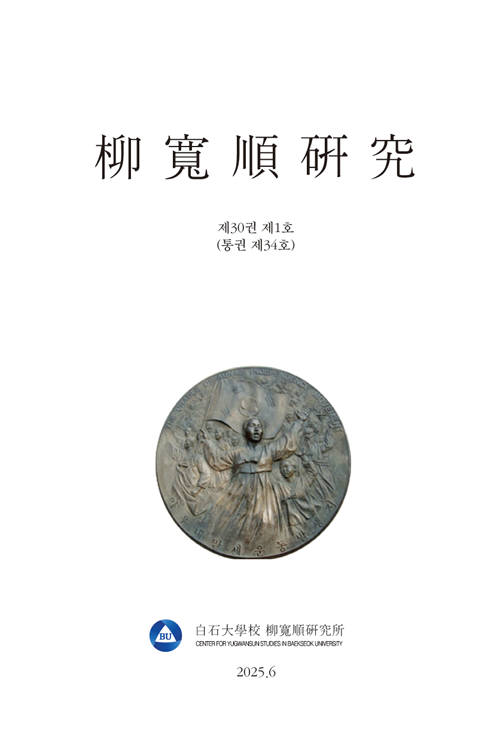- 영문명
- Public Security Laws and Their Enactment Background during the Japanese Colonial Period
- 발행기관
- 백석대학교 유관순연구소
- 저자명
- 최대호(Dae-Ho Choi)
- 간행물 정보
- 『유관순연구』제30권 제1호, 167~210쪽, 전체 44쪽
- 주제분류
- 인문학 > 역사학
- 파일형태
- 발행일자
- 2025.06.30
8,080원
구매일시로부터 72시간 이내에 다운로드 가능합니다.
이 학술논문 정보는 (주)교보문고와 각 발행기관 사이에 저작물 이용 계약이 체결된 것으로, 교보문고를 통해 제공되고 있습니다.

국문 초록
본 논문은 치안유지법의 역사를 고찰하는 연구의 일환으로서, 치안유지법제정 이전에 조선의 치안법령(주로 결사 및 집단행동에 대한 단속법령)의 문제, 치안유지법령의 제정을 검토한 후, 치안유지법의 제정에 있어서 식민지 문제는 어떻게 의식되고 있었는지를 고찰한다. 특히 치안유지법이 제정될 때까지 조선총독부가 시도한 새로운 치안법령 제정의 움직임은 식민지 조선과 치안유지법의 관계를 고찰하였다.
우선, 보통선거법과 연결시키는 견해는 당시 조선인이 날카롭게 비판하고 있는 것처럼 조선의 경우에는 해당하지 않는다. 식민지 조선의 문제가 치안유지법을 제정하는 데 큰 비중을 차지하고 있지는 않았다. 하지만 적어도 총독부 측은 보통선거법을 전혀 고려하고 있지 않았던 것이다. 조선총독부의 치안상황에 대한 인식 그 자체가 조선에 있어서도 치안유지법을 필요로 하고 있으며, 그 것은 본 논문에서 소개한 사이토(斎藤)총독의 담화에서 충분히 파악할 수 있다.
둘째, 일본과 (구)소련간의 기본조약체결은 일본 ‘본토’보다 조선 측이 영향을 받기 쉽다고 인식되고 있었다는 점을 주목하여야 한다. 지리적으로 국경을 접하고 있다는 점, (구)소련에는 20만 정조의 조선인이 거주하고 있으며, 그들은 조선의 독립을 강력히 전하고 있으며, 내전 당시에는 혁명파를 원조하고 빨치산을 조직하였다. 내전이 종결된 후에도 공산당에 가입하여 활동하는 조선인이 많았지만, 총독부는 이것이 조선 전역에 영향을 미쳐 확산될 것이라는 강한 위기감을 느꼈다. 도지사회의에서 정부총감의 훈시에 나타난 것처럼, 일본과 소련 간 조약체결로 인하여 그러한 움직임이 확산되는 것을 사전에 방지하려는 총독부의 입장이 정부의 치안유지법 제정 작업에도 영향을 주었다는 점을 충분히 추측할 수 있다.
조선의 치안상황과 그에 대한 총독부의 인식이 치안유지법을 제정하는 중대한 요인으로 작용하였다고 까지는 말할 수 없더라도, 일본정부의 움직임을 본다면 총독부 당국은 치안유지법 제정·시행에 대하여 적극적인 태도를 취하고 있었다. 법안이 통과되지 않을 경우에는 조선에 대해서만 제령을 공포할 의도를 제시하면서 정부에 대하여 치안유지법을 통과시키라는 압력을 행사했다고 할 수 있다.
영문 초록
This paper, as part of a study examining the history of the Public Safety Preservation Act, examines the problems of public safety laws (mainly laws on the crackdown on associations and group actions) in Joseon before the enactment of the Public Safety Preservation Act, the enactment of the Public Safety Preservation Act, and examines how colonial issues were considered in the enactment of the Public Safety Preservation Act. In particular, the movement to enact new public safety laws attempted by the Japanese Government-General of Korea before the enactment of the Public Safety Preservation Act examines the relationship between colonial Joseon and the Public Safety Preservation Act.
First of all, the view that connects it to the General Election Act, as sharply criticized by Koreans at the time, does not apply to the case of Joseon. The problem of colonial Joseon did not have a large weight in the enactment of the Public Security Preservation Act. However, at least the Government-General did not consider the General Election Act at all. The recognition of the public security situation of the Government-General of Joseon itself requires the Public Security Preservation Act in Joseon as well, and this can be sufficiently understood in the speech of Governor-General Saito introduced in this paper.
Second, it should be noted that the conclusion of the Basic Treaty between Japan and the (former) Soviet Union was perceived as being more easily influenced by the Korean side than by the Japanese ‘mainland’. Geographically, they bordered each other, and there were about 200,000 Koreans living in the (former) Soviet Union, who strongly advocated for the independence of Korea, and during the civil war, they supported the revolutionaries and organized guerrillas. Even after the end of the civil war, many Koreans joined the Communist Party and were active, but the Government-General felt a strong sense of crisis that this would spread and affect all of Korea. (52) As shown in the instructions of the Government Commissioner at the Governors’ Meeting, it can be easily inferred that the Government-General’s position of trying to prevent such movements from spreading in advance due to the conclusion of the treaty between Japan and the Soviet Union also influenced the government’s work to enact the Public Security Preservation Act.
Even if we cannot say that the security situation in Joseon and the Governor-General's perception of it were significant factors in the enactment of the Public Peace Preservation Act, if we look at the movements of the Japanese government, the Governor-General's authorities were taking a proactive stance toward the enactment and implementation of the Public Peace Preservation Act. It can be said that they exerted pressure on the government to pass the Public Peace Preservation Act while indicating their intention to promulgate the ordinance only for Joseon if the bill was not passed.
목차
Ⅰ. 들어가는 말
Ⅱ. 치안유지법 제정 이전의 조선에 대한 치안법령
Ⅲ. 치안유지법 제정과정에 있어서 식민지 문제
Ⅳ. 치안유지법의 식민지 시행
Ⅴ. 나오는 말: 식민지 조선과 치안유지법 제정의 배경
키워드
해당간행물 수록 논문
교보eBook 첫 방문을 환영 합니다!

신규가입 혜택 지급이 완료 되었습니다.
바로 사용 가능한 교보e캐시 1,000원 (유효기간 7일)
지금 바로 교보eBook의 다양한 콘텐츠를 이용해 보세요!



